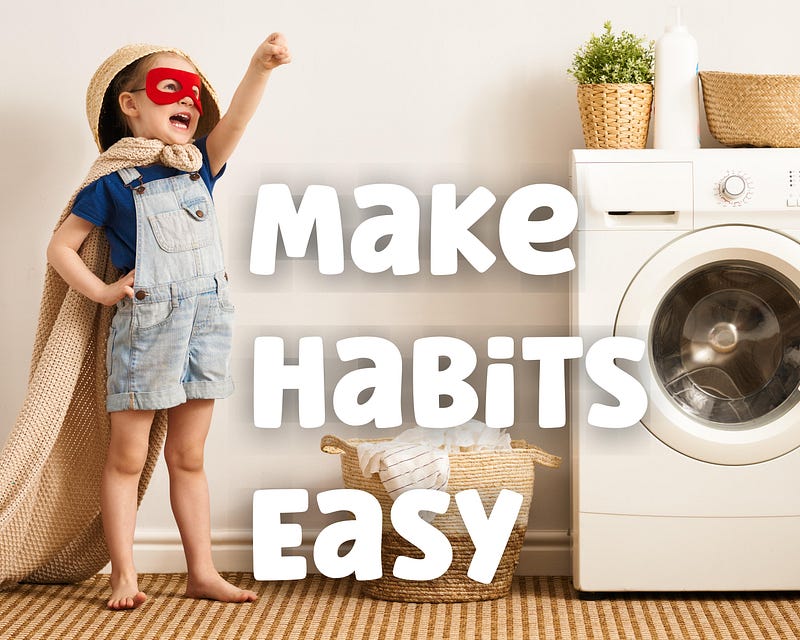Change Process, Not Personality (4 — Easy)
How making habits ‘Easy’ can make them permanent

People want things to be easy for them to do.
They enjoy things that are easy for them to do.
And they’ll keep doing things that are easy to do.
— Dr. Sean Young
Competing Forces
We do many things throughout the course of the day. Some are easy for us to do, and some are not that easy.
We breeze through the easy tasks. We may even look forward to them.
But not so much for the difficult or complex tasks. We might look for ways to escape them or procrastinate in doing them.
This factor — whether the task is difficult or easy is one of the factors that shape what we do and how we act.
“A conflict is to be characterized psychologically as a situation in which oppositely directed, simultaneously acting forces of approximately equal strength work upon the individual.” — Kurt Lewin
If we must choose between an easy task and a difficult or time-consuming one, we are prone to choose the easy one instead of the hard one.
Applying this factor to habits
If the steps or actions involved in the habit that we are trying to form are hard, then we are more likely to skip them.
Let’s take the example of trying to build the habit of going to the gym daily.

If you take a membership to a gym that requires you to drive for 30 minutes every day, you might end up skipping the habit because it is not easy to drive that far after the day’s work.
Whereas, if the gym you choose is 5 minutes away, or maybe somewhere you can walk to, your likelihood of going there is higher.
Let’s take another example that’s reverse — reducing sugar intake.

Here, you are trying to quit something. So, to make your habit of quitting easy, you must make the availability of the sweet stuff harder.
If you keep buying cookies, candies, sugary drinks, etc., in your regular grocery haul, you will still have the same problem.
Also, if you keep the snacks on the kitchen counter, you can easily reach for them and forget all about your resolve to reduce sugar intake.
So here, you need to make it easier on yourself by not buying the stuff you want to avoid. Or placing them where it is not obvious to you so you don’t consume more than the required amount.
Let’s also see one for writers — making writing a daily habit! How can we make that easy?

- Always carry a handy pocket-sized notebook to jot down the ideas that can strike at any moment on any day. Or use a phone app instead.
- Keep a notebook at the bedside for journaling before bed or after waking up.
- Assign a dedicated area for writing with a laptop or writing equipment always set out for easy access.
- Don’t shy away from using your phone for typing in the downtime. For apps like Medium or Google Docs, if you have an internet connection, you can use it to type on the go.
- Keep many topics ready in your drafts in the good writing season when the ideas are flowing.
- Decide on your dedicated writing time and protect it religiously.
- See what excuses you usually make when you skip your writing sessions — it could be other chores, lack of ideas, lack of motivation, or maybe you are out of writing supplies like pens, notebooks, etc.
- Make sure to get these out of the way. That means you actually need to put in the effort to resolve these problems. Get the supplies, find motivation, find ways to generate ideas, and complete the important chores.
- It will not become ‘Easy’ someday or somehow by magic. You need to do the work that will, in turn, make the job of writing actually easier for you.
- Sprinkle the writing tools and materials at your favorite spots for sitting or the regular places you frequent around your house. Or the bags that you carry. Have some kind of writing items ready for whenever you feel the urge or have the time. Let that not be the reason stopping you from writing.
Now, let’s see the science behind making the habits easy to follow.
Dr. Sean Young talks about — Three Areas of Science on How to Make Things Easy — control the environment, limit choices, or use a road map.
Let’s see what each of these are:
Control The Environment
“Small changes in your environment can lead to big changes in behavior.” — Dr. Sean Young
As we saw in the examples above — control the environment around you.
Like in the case of the sweets — reduce the availability. And in the case of the writer — sprinkle the writing supplies in your environment.
These are simple examples of very common problems. Your habit might be more complex, requiring more critical changes to the environment around you.
Give yourself permission to spend that time and effort to make controlled changes to the environment.
If it is really important to you, and if it will really impact your future, then go ahead and make those changes to your environment.
Limit Choices
Don’t fall into ‘Choice Paralysis.’
There might be situations when this is a limiting factor.
Let’s say for the writer if there are many options for spending her free time, she may not choose writing if there are other easier options.
Make the choice easy. Limit the choices that you have on the ways that you can spend that time.
For unhealthy eating habits — limit the choices of foods available for you to eat. Well, I’m really hungry, and there’s just a salad or some eggs and some other healthy options. So I really have to choose from among those.
You might not have the energy to go out to the store and get something unhealthy when you are really hungry. So, you have successfully limited your options.
For the gym habit — keep that time open. No other activities are planned for the gym time. So, the limited option allows you to go to the gym regularly.
Use A Road Map
“A road map or plan is helpful because it makes it easier for people so that they don’t have to think about how to get from point A to B.” — Dr. Sean Young
A road map makes it easier to do things as they have been mapped out or stated clearly.
For writing regularly, if you have a set of articles or tasks mapped out, it will be easier to follow that path instead of thinking about what you should write.
For example, this series on habits that I am working on now makes it very easy for me to wake up the next day and write on the next step.
Another example is a career change — if there is a road map of all the training and certifications you need, and the places where you need to apply, etc., it is easier to follow through with all the tasks.
How Did I Apply Easy To My Reading Habit? (* * * * *)
- Control the Environment: Children’s books were placed in many different places throughout my house — the play area, nightstand beside the bed, bookshelf, in the car for reading on the go, kitchen island, dining table for reading during feeding meals, etc.
- Limit Choices: Some Examples — when we were on a long drive up to the age of 5, we did not have any other options in the car for my son except for reading books or snacking. Also, while having meals when he was a baby, there was only the option of listening to mommy read.
- Use a Road Map: My road map was the journey of a thousand books that kept me on track. This made it really easy as I knew where I was going. It was not simply reading every day or every night at bedtime. All those books were logged and added up to a goal.
So, my experience with the Force of Easy is 5 stars (* * * * *)!
I hope you learned something new and are motivated to give this a try in your new habit!
Read More: * Here is the Series — Change Process, Not Personality. * Here is the story about Reading 1000 Books With My Son
Thank you for taking the time to read!
